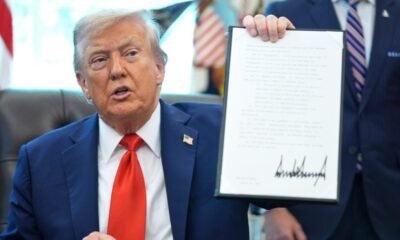Top Stories
Rapper Kevin Gates’ Wife Dreka Files for Divorce

Rapper Kevin Gates
Wife Files For Divorce
Published
Rapper Kevin Gates is getting served … because his wife just filed for divorce.
Dreka Gates, who used to manage Kevin, beelined it to court Wednesday and filed for divorce from Kevin after 9 years of marriage.
In the docs, obtained by TMZ, Dreka lists the date of separation as July 10 … and she’s going with the boilerplate “irreconcilable differences” as the reason for the split.
Kevin and Dreka have two minor children — 12-year-old Islah and 11-year-old Khaza — and Dreka is seeking joint legal and physical custody of the kids.
Dreka is also seeking spousal support … and she checked the box to terminate the court’s ability to award spousal support to Kevin.
It’s unclear if there is a prenup.
Kevin and Dreka got hitched in October 2015 … so the divorce filing comes a few months shy of what would have been their 10th wedding anniversary.
We reached out to Kevin’s camp … and his rep says Kevin is “unfortunately” declining to speak on the matter at this time.
Top Stories
Michael Jordan, Mia Hamm attending Bill Belichick’s UNC debut

There couldn’t be more hype around Bill Belichick’s UNC debut on Monday.
Outside of the expectations around the head coach in his first football game since coaching the Patriots for 23 years and winning six Super Bowls as one of the most decorated coaches in the sport’s history, he will be putting on a show in front of elite company at Kenan Memorial Stadium.
Those expected to attend the Tar Heels’ season opener against TCU in Chapel Hill include Michael Jordan, Mia Hamm, Lawrence Taylor, Julius Peppers, Eric Church, Chase Rice, and Blake Snell, according to ESPN.
Jordan, Hamm, Taylor, and Peppers all played collegiately in their respective sports for the Tar Heels.
Country singer Rice also attended UNC while Church, who is an Appalachian State alumnus, is a North Carolina native.
Belichick, 73, is taking over the program his father once coached at after a season in the media following his split with the Patriots.
He will look to turn it around for the university most known for its basketball program. The Tar Heels have won double-digit games just once, in 2015, since 1997. They last won the ACC in 1980.
Last season, the team went 6-7 overall and 3-5 in conference.
Belichick’s girlfriend, 24-year-old Jordon Hudson, is also a highly anticipated guest for the Sunday night game.
Top Stories
A federal appeals court ruled against Trump’s tariffs. Here’s what could happen next.

President Trump has claimed the authority to bypass Congress and impose sweeping tariffs on foreign products, arguing the import duties are necessary to strengthen the U.S. economy.
Now a federal appeals court has thrown a roadblock in his path.
The U.S. Court of Appeals for the Federal Circuit ruled Friday that Mr. Trump went too far when he declared national emergencies to justify tariffs on nearly every country on Earth. The ruling largely upheld a May decision by a federal trade court in New York.
But Friday’s 7-4 appeals court decision tossed out a part of that ruling striking down the tariffs immediately, giving his administration time to appeal to the U.S. Supreme Court. The ruling represents a major setback for Mr. Trump, who has said his trade policies will enrich the U.S. by bringing back manufacturing jobs and contributing billions in new revenue for the federal government.
“This ruling highlights a serious legal threat to one of the president’s most high-profile economic policies,” said Nigel Green, CEO of financial advisory company deVere Group, in an emailed report.
On Friday, Mr. Trump lashed out against the 7-4 ruling in a Truth Social post, calling the appeals court “Highly Partisan” and noting that the tariffs are still in effect.
Six of the seven judges who ruled against the tariffs are appointees of Democratic presidents, while the seventh is an appointee of former President George H.W. Bush. Of the four judges who dissented, two were appointed by former President Obama and two by former President George W. Bush.
Here’s what could happen next as the legal case proceeds.
How did the dispute arise?
Friday’s ruling came as part of a months-long legal challenge over the tariffs brought by Democratic states and small businesses, which are arguing that the president has exceeded his authority in issuing the import duties.
The appeals court’s decision is focused on the tariffs Mr. Trump imposed in April on most trading partners, along with earlier levies on China, Mexico and Canada.
Mr. Trump on April 2 — or Liberation Day, he called it — imposed so-called reciprocal tariffs of up to 50% on countries with which the U.S. runs a trade deficit and 10% baseline tariffs on almost everybody else.
The president later suspended the reciprocal tariffs for 90 days to give countries time to negotiate trade agreements with the U.S. — and reduce their barriers to American exports. Some of them did — including the U.K., Japan and the EU — and agreed to deals with Mr. Trump to avoid even bigger tariffs.
Countries that didn’t comply faced higher tariffs earlier this month. Laos got rocked with a 40% tariff, for instance, and Algeria with a 30% levy. Mr. Trump also kept the baseline tariffs in place.
What is the IEEPA?
Mr. Trump justified the taxes under the 1977 International Emergency Economic Powers Act, or IEEPA, by declaring longstanding U.S. trade deficits “a national emergency.”
In February, he’d invoked the law to impose tariffs on Canada, Mexico and China, saying that illegal immigration and drug trafficking amounted to a national emergency and that the three countries needed to do more to stop it.
The U.S. Constitution gives Congress the power to set taxes, including tariffs. But lawmakers have gradually let presidents assume more power over tariffs — and Mr. Trump has made the most of it.
Does the ruling apply to all tariffs?
No, the court’s ruling doesn’t cover all of Mr. Trump tariffs. For instance, his levies on foreign steel, aluminum and autos were imposed under a different regulation after Commerce Department investigations concluded that those imports were threats to U.S. national security.
Nor does it include tariffs that Mr. Trump imposed on China in his first term — and President Biden kept — after a government investigation concluded that the Chinese used unfair practices to give their own technology firms an edge over rivals from the U.S. and other Western countries.
The administration had argued that courts had approved then-President Richard Nixon’s emergency use of tariffs in the economic chaos that followed his decision to end a policy that linked the U.S. dollar to the price of gold. The Nixon administration successfully cited its authority under the 1917 Trading With Enemy Act, which preceded and supplied some of the legal language later used in IEEPA.
In May, the U.S. Court of International Trade in New York rejected the argument, ruling that Trump’s Liberation Day tariffs “exceed any authority granted to the President” under the emergency powers law. In reaching its decision, the trade court combined two challenges — one by five businesses and one by 12 U.S. states — into a single case.
On Friday, the federal appeals court wrote in its 7-4 ruling that “it seems unlikely that Congress intended to … grant the President unlimited authority to impose tariffs.”
What happens next?
The president vowed to take the fight to the Supreme Court. “If allowed to stand, this Decision would literally destroy the United States of America,” he wrote on his social media platform on Friday.
A dissent from the judges who disagreed with Friday’s ruling clears a possible legal path for Mr. Trump, concluding that the 1977 law allowing for emergency actions “is not an unconstitutional delegation of legislative authority under the Supreme Court’s decisions,” which have allowed the legislature to grant some tariffing authorities to the president.
The government has argued that if Mr. Trump’s tariffs are struck down, it might have to refund some of the import taxes that it’s collected, delivering a financial blow to the U.S. Treasury. Revenue from tariffs totaled $159 billion by July, more than double what it was at the same point the year before.
Tariffs are paid by U.S. importers, such as American manufacturers or retailers that rely on foreign-made products. While the U.S. companies typically swallow some of the cost, they pass on much of the added expenses to consumers in the form of higher prices.
The Justice Department warned in a legal filing this month that revoking the tariffs could mean “financial ruin” for the U.S.
It could also put Mr. Trump on shaky ground in trying to impose tariffs going forward.
“While existing trade deals may not automatically unravel, the administration could lose a pillar of its negotiating strategy, which may embolden foreign governments to resist future demands, delay implementation of prior commitments or even seek to renegotiate terms,” Ashley Akers, senior counsel at the Holland & Knight law firm and a former Justice Department trial lawyer, said before the appeals court decision.
Does the Trump administration have other options?
Mr. Trump does have alternative laws for imposing import taxes, but they would limit the speed and severity with which he could act.
For instance, in its decision in May, the trade court noted that Mr. Trump retains more limited power to impose tariffs to address trade deficits under another statute, the Trade Act of 1974. But that law restricts tariffs to 15% and to just 150 days on countries with which the U.S. runs big trade deficits.
The administration could also invoke levies under a different legal authority — Section 232 of the Trade Expansion Act of 1962 — as it did with tariffs on foreign steel, aluminum and automobiles. But that requires a Commerce Department investigation and cannot be imposed at the president’s sole discretion.
“Even if the tariffs are struck down, we believe the Trump administration will look for new ways to tax imports or otherwise raise revenue from companies selling into the U.S.,” noted Green of the deVere Group.
Top Stories
Boy, 11, shot dead after playing doorbell-ringing prank in Houston, police say | Houston

An 11-year-old boy playing a common prank game of ringing doorbells in Houston, Texas, was shot dead on Saturday as he ran away from a house.
Authorities said the boy was struck several times as he and some friends were buzzing doorbells in an Eastside neighborhood.
The Houston police department have not released the identity of the boy or the occupant of the home, but said a middle-aged man has been arrested and several weapons were later recovered from the home.
Police said the boy had been playing “ding-dong ditch”, which involves ringing on the doorbell of a home and running away. A witness saw the boy ring a doorbell and flee the property before he was struck by gunfire.
“A witness stated the male was running from a house, after ringing the doorbell, just prior to suffering a gunshot wound,” police said in a police statement.
Neighbors later told KPCR 2 that a man was seen being led in handcuffs out of a police vehicle and walking him to the home where the shooting happened.
Houston homicide detective Michael Cass told CBS News affiliate KHOU that a witness had recalled someone exiting the house that was pranked and “shooting at the kids running down the street”.
“Unfortunately, sadly enough, one of the boys, who was 11 years old, was shot in the back,” Cass said.
The game has led to deaths before. In 2023, a California man was found guilty of murder for intentionally ramming the car of six teens who buzzed his doorbell, killing three.
In May, a man in Virginia was charged with second-degree murder after he shot and killed a teenager who had filmed a TikTok video playing the doorbell game on the man’s home at 3am, according to local police reports.
-

 Business3 days ago
Business3 days agoThe Guardian view on Trump and the Fed: independence is no substitute for accountability | Editorial
-
Tools & Platforms3 weeks ago
Building Trust in Military AI Starts with Opening the Black Box – War on the Rocks
-

 Ethics & Policy1 month ago
Ethics & Policy1 month agoSDAIA Supports Saudi Arabia’s Leadership in Shaping Global AI Ethics, Policy, and Research – وكالة الأنباء السعودية
-

 Events & Conferences3 months ago
Events & Conferences3 months agoJourney to 1000 models: Scaling Instagram’s recommendation system
-

 Jobs & Careers2 months ago
Jobs & Careers2 months agoMumbai-based Perplexity Alternative Has 60k+ Users Without Funding
-

 Funding & Business2 months ago
Funding & Business2 months agoKayak and Expedia race to build AI travel agents that turn social posts into itineraries
-

 Education2 months ago
Education2 months agoVEX Robotics launches AI-powered classroom robotics system
-

 Podcasts & Talks2 months ago
Podcasts & Talks2 months agoHappy 4th of July! 🎆 Made with Veo 3 in Gemini
-

 Podcasts & Talks2 months ago
Podcasts & Talks2 months agoOpenAI 🤝 @teamganassi
-

 Mergers & Acquisitions2 months ago
Mergers & Acquisitions2 months agoDonald Trump suggests US government review subsidies to Elon Musk’s companies






















